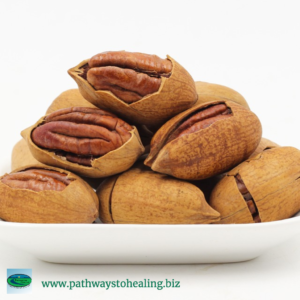By: Dr. Alyssa Musgrove
 If you’re looking for a quick, convenient, nutrient-dense snack option, you really can’t do better than a small handful of raw nuts or seeds. There are a host of health benefits associated with eating raw nuts, which some experts even refer to as a “superfood.”
If you’re looking for a quick, convenient, nutrient-dense snack option, you really can’t do better than a small handful of raw nuts or seeds. There are a host of health benefits associated with eating raw nuts, which some experts even refer to as a “superfood.”
The Mayo Clinic notes that eating nuts can lower your LDL, or bad cholesterol, while improving the health of your artery linings. In addition, nuts and seeds are an excellent source of protein, antioxidants, fiber, amino acids, minerals and omega oils. These nutrients boost heart, brain and digestive health, while fighting free radicals. The high fat and protein content of nuts also helps with satiety and controls hunger by stabilizing blood sugar.
Almonds are the most nutrient-dense nut. The almond skin is rich in antioxidants including phenols, flavonoids and phenolic acids. A study in the Journal of Agricultural and Food Chemistry revealed that one serving of almonds contains a similar amount of polyphenols as a cup of steamed broccoli or green tea! Almonds also have one of the highest protein contents of nuts, nearly one gram of protein per almond.
Brazil nuts contain a high amount of the trace mineral selenium, which is a powerful antioxidant and aids in boosting the immune system. It is believed that selenium can benefit heart health by its ability to fight inflammation and increase blood flow.
Cashews contain a large amount of oleic acid, a heart-healthy fat. They are also a great source of biotin, copper, iron, magnesium, and zinc.
Hazelnuts are rich in many antioxidants, as well as vitamin E, arginine and B vitamins.
Macadamia nuts have the highest protein concentration in one serving. They are also a great source of fiber, magnesium and potassium.
 Pecans contain over 19 vitamins and minerals! They are second highest in protein content and include calcium, copper, folic acid, manganese, magnesium, phosphorus, potassium, zinc and include B vitamins, as well as A and E.
Pecans contain over 19 vitamins and minerals! They are second highest in protein content and include calcium, copper, folic acid, manganese, magnesium, phosphorus, potassium, zinc and include B vitamins, as well as A and E.
Pine nuts may help with weight loss because they contain pinolenic acid, which triggers the release of an appetite-suppressing hormone. Pine nuts are most often used in recipes to make pesto.
Walnuts have recently been hailed a “superfood,” due to high levels of omega-3 fatty acids, linoleic acid, vitamin E, and vitamin B6. Pumpkin seeds are a nutritional powerhouse with a wide variety of nutrients ranging from copper and zinc to magnesium and manganese, and are also high in protein. The high zinc content in pumpkin seeds can boost prostate health.
(It’s important to point out that, although commonly viewed as a nut, peanuts are actually legumes and grow underground. For a variety of reasons, I do not recommend my patients eat peanuts.)
While nuts and seeds are very healthy, they are high in fat and protein. It is very easy to overindulge in nuts, eating too many servings (and thus consuming too many calories) in one sitting. One serving is considered one ounce. The following list details how many nuts are in a single serving. Eating a variety of nuts is your best bet, and moderation is crucial.
Almonds (20-24 nuts): 160 calories, 14g fat, 6g protein
Brazil Nuts (6-8 nuts): 190 calories, 19g fat, 4g protein
Cashews (16-18 nuts): 160 calories, 14g fat, 4g protein
Hazelnuts (18-20 nuts): 180 calories, 17g fat, 4g protein
Macadamia (10-12 nuts): 200 calories, 22g fat, 2g protein
Pecans (18-20 halves): 200 calories, 20g fat, 3g protein
Pine Nuts (150-155 nuts): 160 calories, 14g fat, 7g protein
Walnuts (14 halves): 190 calories, 18g fat, 4g protein
Pumpkin seeds (140 hulled) calories 153, 13g fat, 7g protein
 When purchasing nuts, look for raw options. Roasted nuts are often processed in hydrogenated oils (a harmful fat source), which destroys the nutritional benefit nuts have in their raw form. Additionally, roasted nuts are frequently coated in sugar or other unhealthy ingredients. If you prefer roasted nuts and seeds, roast them yourself so that you can control the roasting temperature to keep the nuts as nutrient-dense as possible. Raw pumpkin seeds, for instance, can be roasted on a low-heat setting in the oven (no more than 170 degrees Fahrenheit for about 15 to 20 minutes), and sprinkled with Himalayan or other natural salts.
When purchasing nuts, look for raw options. Roasted nuts are often processed in hydrogenated oils (a harmful fat source), which destroys the nutritional benefit nuts have in their raw form. Additionally, roasted nuts are frequently coated in sugar or other unhealthy ingredients. If you prefer roasted nuts and seeds, roast them yourself so that you can control the roasting temperature to keep the nuts as nutrient-dense as possible. Raw pumpkin seeds, for instance, can be roasted on a low-heat setting in the oven (no more than 170 degrees Fahrenheit for about 15 to 20 minutes), and sprinkled with Himalayan or other natural salts.
Nuts are a simple addition to your daily diet. Add pumpkin seeds to healthy sautéed vegetables. Sprinkle nuts on top of a mixed green salad for enhanced crunch. Add chopped nuts to hot oatmeal to increase the protein and fiber content. Eat nuts with your fruit and yogurt, or add to your granola. You can also create a simple pre- or post-workout snack by mixing nuts with dates and dried fruit for a healthy homemade 3-ingredient energy bar. Or, throw together this simple trail mix for an easy snack on the go:
Superfood Trail Mix
Recipe courtesy of thehealthyfamilyandhome.com
- 1 cup organic almonds
- 1 cup organic cashews
- 1/2 cup organic goji berries
- 1/2 cup organic dried mulberries
- 1/2 cup organic dried blueberries
- 1/2 cup organic sunflower seeds
- 1/2 cup organic cacao nibs
- 1/2 cup organic coconut flakes
Combine all ingredients in a medium size bowl and toss well. Store in an air-tight container until ready to eat.
 Pathways to Healing specializes in holistic chiropractic care. Dr. Alyssa Musgrove draws on a variety of techniques, including chiropractic, kinesiology, nutrition, food allergy testing and lifestyle counseling to assist clients in achieving optimal health and wellness in one setting. Pathways to Healing is located at 1022 Founders Row, Lake Oconee Village, Greensboro. The office can be reached at 706-454-2040.
Pathways to Healing specializes in holistic chiropractic care. Dr. Alyssa Musgrove draws on a variety of techniques, including chiropractic, kinesiology, nutrition, food allergy testing and lifestyle counseling to assist clients in achieving optimal health and wellness in one setting. Pathways to Healing is located at 1022 Founders Row, Lake Oconee Village, Greensboro. The office can be reached at 706-454-2040.